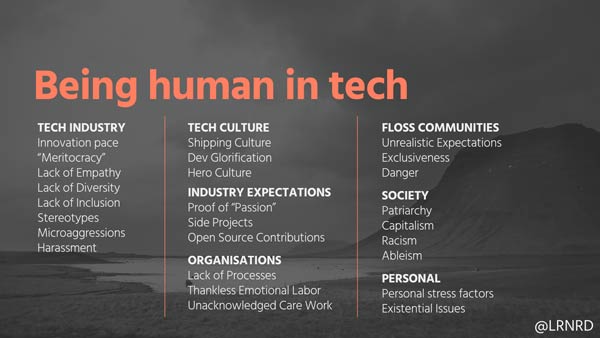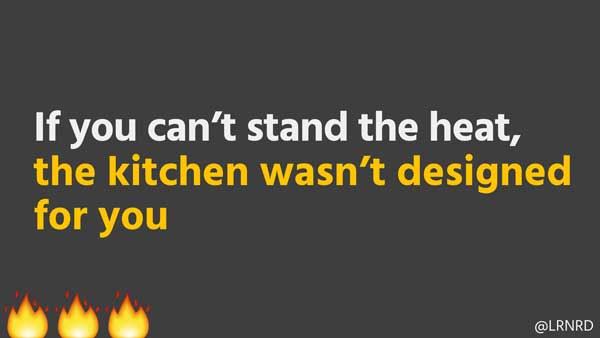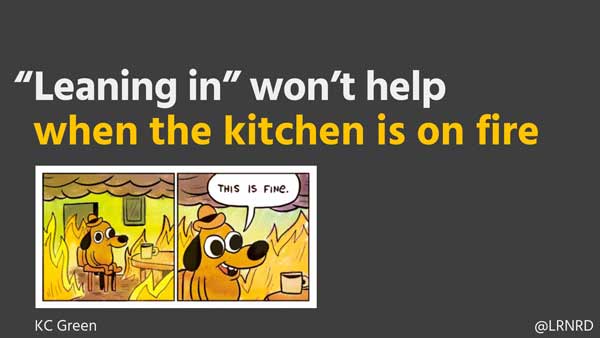Existing in the Tech Industry
Existing in the Tech Industry: How to cope with the pressure of a fast-paced Environment
This page includes an extended version of the talk I gave at CSSConf Nordic 2016, and links to resources. The Video of the talk is online here.
Trigger Warning (for video and content below): Covering burnout, depression, harassment. Includes mention of abuse.
✨⭐️✨
Table of Contents:
- Intro
- Layers that shape our existence in Tech
- Tech Industry
- Characteristics: Innovation pace, “disruption”, “meritocracy”, lack of empathy, lack of diversity & inclusion, stereotypes, fighting for representation, microaggressions, harassment, how we talk about our work
- Culture: Shipping culture, glorification of software developers, hero culture, need for social capital
- Expectations: “Passion” for software development, side project expectation, Open Source contributions
- Communities
- Unrealistic expectations towards maintainers, exclusiveness, danger
- Organisations
- Lack of processes, thankless emotional labor, lack of acknowledgement for care work
- Society
- Patriarchy, Capitalism, Racism, Ableism
- Being Human
- Personal stress factors, existential issues,…
- Tech Industry
- Consequences
- Stress, Burnout, Depression,…
- About “Existing”
- If you can’t stand the heat…
- Things I’ve learned about existing in tech
- Workarounds
- For Immediate Relief
- Prevention Techniques
- Trial and Error
- The most important thing
*****
Intro
I’ve been living with depression for many years of my life, and I’ve had two periods of burnout during my time in tech.
This is a talk about existing in the tech industry.
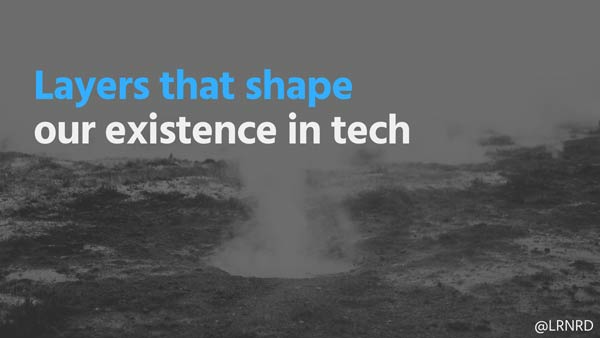
Over the past years, I’ve seen many people struggle with existing in tech, I’ve seen people stay, and I’ve seen people choose to leave. I’ve also seen what working and being in tech did to me. So I tried to learn more about the factors that can make being in tech difficult. Our experiences as humans in tech are shaped by different layers.
Layers
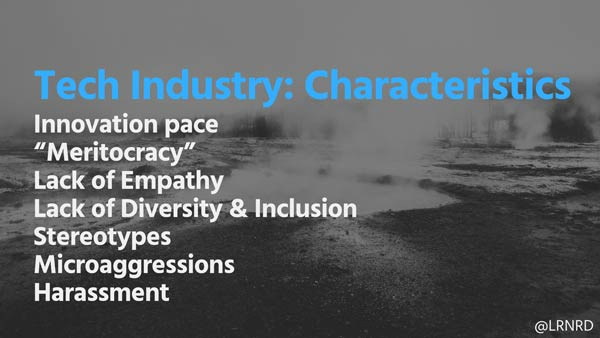
Let’s start by looking at the tech industry’s own characteristics:
First of all, there’s this industry’s extreme innovation pace, demanding constant learning and skill improvement from us if we want to keep up with the latest developments. Innovation pace in tech is mostly extreme – it’s either too slow or too fast. To us as software developers, designers, or managers in the field, it often feels just super fast. Over the past few years only, 26 new JavaScript frameworks have been released, and several CSS methodologies and modules – from additional CSS3 modules, to CSS4 level modules, to CSS frameworks, to authoring methodologies like OOCSS, BEM, or SMACSS, and preprocessors like SASS or LESS. On top of that, there are new browsers to optimise for, new devices to design and develop for, and more. Keeping up with this innovation pace while doing your regular job can be very stressful and difficult.
There are several myths in the tech industry that many people still believe in and hold others to – but that cause lots of harm.
First of all there’s disruption. Disruption is one of *the* buzzwords that tech companies use to describe their business models. It once referred to small companies taking over market leadership positions by offering simpler or cheaper solutions than existing market leaders. Disruption has now become a buzzword to attract investors, an idea that startup founders strive for in a quest for venture capital – and on their road to exploiting people they work with, and ignoring laws on a regular basis. Disruption has become an excuse for harming the people we work with, the people in the industries we want to disrupt, and the people affected by it.
- Disruption: Silicon Valley’s Buzzword
- The Problem with “Disruption” and the Idealization of Meritocracy in Tech
Then there’s the myth of meritocracy. Meritocracy is the illusion that people can be judged by their merit only, and that this judgement was objective. But the concept of meritocracy was originally created to make fun of just this idea. It was a dystopian idea in the first place, and coined as a warning. Meritocracy is a joke that has been taken too seriously by too many people. Nowadays, the whole concept of status, opportunities and rewards in tech is built around that myth. And tech is not a meritocracy: networks exist. Power structures exist. Sexism exists. Racism exists. We all have biases. – Meritocracy is nothing more than a pseudo-scientific myth that people can hide behind when they want to explain why they’ll only allow people in their spaces who are and look like them. And it’s used as an excuse for abuse and homogeneous spaces.
- There’s no merit in meritocracy
- Making it Past the Lobby of the Meritocracy
- The Open Source Identity Crisis
This industry also lacks empathy and compassion: from lack of empathy for the users of our software and their needs, to lack of empathy for other community members or coworkers. This means, especially for underrepresented people in tech, that they can’t get anyone to hear them and understand their struggles. In the end, they’re mostly there by themselves. It also puts even more pressure on them to do more emotional work – for themselves, other underrepresented people in tech, and user groups whose needs are not heard by companies.
- Showing empathy in the tech industry
- Breaking the Tech Language Barrier: How Empathetic Communication Can Bridge the Gaps
Tech is a mostly homogeneous space that lacks diversity and inclusion. If you’re not the stereotypical young white man nerd, you’ll often be the only person who’s like you in any tech space. – Which can lead to the strong feeling of not belonging, and of being an outsider. This can even make tech spaces dangerous for many of us.
Go to a tech meetup, and you’re one of only few women there. Attend a hackathon, and it’s hard to find a group of hackers that’s not all men. Look for an Open Source project to contribute to, and it’s difficult to find one that’s not all men. If you’re not a cis white man, it can be very hard to find people who are like you – people who make similar experiences, share your background, and understand your struggles. That goes for women, even more for women of colour, disabled people, people who are older than 45 years, people who changed careers, people with mental health issues or chronic illnesses, lesbian, gay, bisexual, intersexual, and trans people, non-binary people, migrants, people whose first language is not English, and many, many more.
There are many reasons for this lack of diversity in different spaces, and the main reason is that tech is a hostile, dangerous, unsafe environment. It’s not the fault of underrepresented people that we’re not there. The tech industry isn’t an ungendered, neutral space. It’s been designed to support the needs of a very specific group of people.
Fighting for our own representation – Most groups who are not cis white men are chronically underrepresented in tech. Many members of these groups are also fighting to end this underrepresentation, and raise awareness for diversity, inclusiveness, social justice and the cultural issues in our industry. Right now, this work is mostly done by underrepresented people – who are fighting for their own representation in this industry. This work is extremely important, it’s the only way to build a future for this industry. Still, it mostly goes unpaid, and the people who do it face mostly harassment in return. This work is exhausting, even more for people like women of colour who face oppression on many different levels. And it can lead to exhaustion.
- The responsibility of diversity
- On fighting for marginalized people in tech
- Dear marginalized people coming into tech
This lack of diversity and inclusion also reinforces stereotypes about who belongs in this industry, meaning that everyone who doesn’t fit the stereotype constantly has to either work to fit the stereotype, or constantly prove that they’re worthy of being in this space, despite being “different” – which means additional work for them. This is especially difficult for members of underrepresented groups in tech like women, people of colour, lesbian, gay, bisexual, intersexual, non-binary people, disabled people, older people, or people with physical or mental illnesses. You probably remember the hashtag #ilooklikeanengineer that was started by Isis Wenger last summer, and that shows amazing people who don’t fit this stereotype.
Also prevalent in this industry are Microaggressions. Microaggressions are subtle, offensive comments or actions directed at members of underrepresented groups in tech. These microaggressions are small and happen often, and they’re extremely hurtful. According to a recently published survey, more than 84% of women in tech were told that they were being too aggressive, and received demeaning comments from male colleagues. Some examples for typical microaggressions in tech: Whena woman at a conference is asked: “Are you here with your boyfriend?”, or “Do you work in marketing?” Or when a woman of colour is asked, “So, where do you *really* come from?”
Microaggressions can make people feel alienated, excluded, and feel like they don’t belong to a group or into a space. The worst about them is that they occur often. Very often. They add up, add up to a feeling that you don’t belong here – because you’re different from what people suppose is the norm.
- Microaggressions.com
- Unmasking racial microaggressions
- Ways men in tech are unintentionally sexist
- How microaggressions reinforce stereotypes in tech
- Microaggressions in the tech industry
And there’s harassment everywhere in this industry: sexual harassment, threats, and abuse, occurring at workplaces, events, and in online spaces; many underrepresented people in tech experience this type of harassment on a daily basis.
- Elephant in the Valley
- Timeline of incidents
- Model View Culture: Resources – Abuse
- Sexual harassment in tech survey (source 2)
And then there’s the way we talk about our work. Every day, countless think pieces and presentations are published, in which people – very often cis white men – argue about which technology to use, which not to use, if SASS or LESS is better, why all JavaScript frameworks are horrible, and, finally, why you should really use EMACS over VIM – or the other way around. This adds an additional layer of noise, and this noise can sometimes be difficult to deal with, especially for people new to this industry. – Even more when these think pieces include bashing. Criticism of people’s works is often only disguised as criticism, while it’s actually bashing people and attacking them personally – which can ruin people’s motivation to even keep on working. We sometimes forget that, behind the technology out there, there are actual human beings.
We also forget that, by expressing contempt (or even hatred or disgust, or even by making what we think are “jokes” about other technologies), we exclude people – and the things they work on, and care about. This is harmful, this is hurtful.
Tech Culture
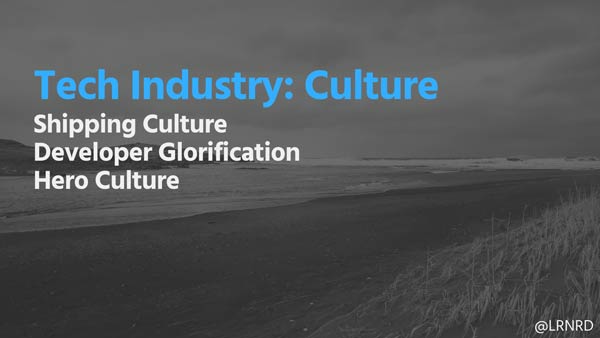
The tech industry’s cultural issues add to that.
This industry celebrates shipping culture: the idea that release cycles should be short has now turned into a culture that values doing more than thinking. Quick iterations can be useful, but the mighty culture we have established around shipping is hurtful. We’ve come to a point where we “ship constantly” for the wrong reasons. Shipping culture induces enormous pressure on humans. But we can’t solve problems if we don’t allow ourselves time to think about them. – This is an imperative ignored by our shipping culture, which values doing more than thinking.
Shipping culture also excludes non-coding team members, since non-coding-related tasks like design, marketing, project management, writing, administration or others often don’t lead to things that can be “shipped”. It also keeps people from looking beyond their own horizons. – From looking into one of the numerous pressuring cultural topics which are going on here, because work on cultural topics, as well as work on diversity and being an ally is nothing that people can ship and earn merit for. Its merit-centered approach makes shipping culture even dangerous.
In tech, we also perpetuate the widespread glorification of software developers. Developers are celebrated as unicorns, while non-coders are widely under-appreciated, underpaid, and their skills are belittled as “soft skills.”
- How the Glorification of Software Developers Compromises Tech Companies
- Non-coders in Open Source Projects (part 2)
The tech industry is also keeping Hero Culture alive. Hero Culture is the admiration and worshipping of individuals for their past or present work: like writing specific frameworks, programming languages, started movements, or who have done big contributions to Free, Libre, and Open Source software. These people have done great technical work, and many of them are considered heroes: their opinions on all sorts of things are highly valued, their work is applauded, and they’re admired and followed by many people in tech.
This worshipping of heroes and the hero culture we built around it have been very harmful to the tech community though for several reasons:
- Hero culture has made it difficult to hold these heroes accountable to their present actions. The past work that some people have done has been so impactful, and they’re in such powerful positions because of it, that it’s become difficult to criticise them for present actions, since many people hold them and their opinions and actions high and defend them agains criticism – criticism for actions like sexist or racist comments, homophobia, abusive behaviour, and creating exclusive spaces.
- This is deeply linked with the false belief in meritocracy. Right now in our communities, you can be an abusive bad person as much as you want – as long as you contribute relevant technical things. This way, we end up normalising harassment in our communities.
- This culture perpetuates unrealistic expectations to what people need to achieve. It can make people feel like they’re irrelevant as long as they haven’t written their own framework or worked for a big Silicon Valley company.
- Hero culture can also lead to burnout, prevents knowledge sharing, and
- is disempowering.
Then there’s the need for social capital in tech. Social capital is the recognition you get from working on an Open Source project in your spare time, or when you have many twitter followers, when you know people who are famous in the industry, when your blog posts about specific topics are widely shared and appreciated. These and other things lead to recognition, and can even be huge factors that get you hired. Without any of this social capital, getting your voice heard in tech can be extremely different. This social capital often has to be acquired by working for free, which is impossible for many people – and again leads to stress.
Expectations
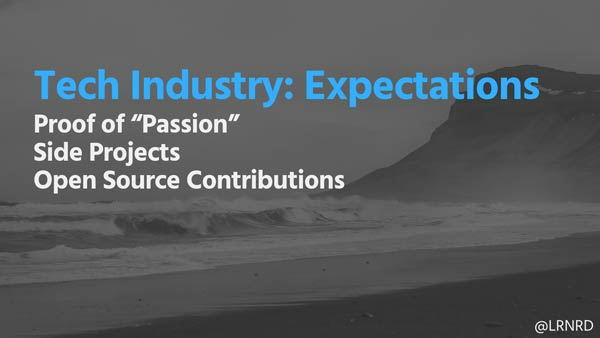
Then we have the vast number of expectations to humans in tech that are extremely unrealistic, but that we consider “normal”:
Like the widespread expectation that software developers need to be “passionate” about their work, and constantly prove that, for example, by doing unpaid Open Source contributions or hackathons in their spare time. Many people in tech are passionate about their work. Passion can be a great motivator, driver to learn, and can help people succeed. But in tech, the demand for passionate people has become an excuse by companies for harmful hiring practices, exploitation of people and exclusion – and lack of passion has become an allegation towards Open Source project maintainers who don’t spend all their time on the project. We’re using passion and lack thereof to blame people who don’t want to or can’t work for free in their spare time. And we must stop that. Many software dev job descriptions nowadays make passion for software development a requirement. And that’s harmful, because it perpetuates an exclusive nerd stereotype, and automatically excludes a vast number of people.
- The Cult of Work You Never Meant to Join
- The Many, Many Problems With “Follow Your Passion”
- My Passion Was My Weak Spot
Or the expectation that developers need to have side projects – projects that you work on outside your regular work hours: to try out new technologies, to build something cool, to show your “passion”. Many companies use side projects to judge job candidates, and side projects can undoubtedly help your career. But this judgement and the side project expectation are super unhealthy. This sets a standard that’s very hard to achieve.
Same goes for the expectation that developers need to contribute to Open Source to hone their skills. Many people like contributing to Open Source – but expecting people to do so and making it another hiring criterion is wrong on so many levels. This expectation is also kept alive since many major organisations are benefitting from Open Source work – but are still not willing to pay contributors.
Per default, all these expectations already set the bar so high that only a very small group of people has any chance of reaching them. A very small group of people that precisely fits the stereotype of who belongs in this industry.
Aside from all these issues in the overall tech industry, there are issues specific to other levels: like our communities.
Communities
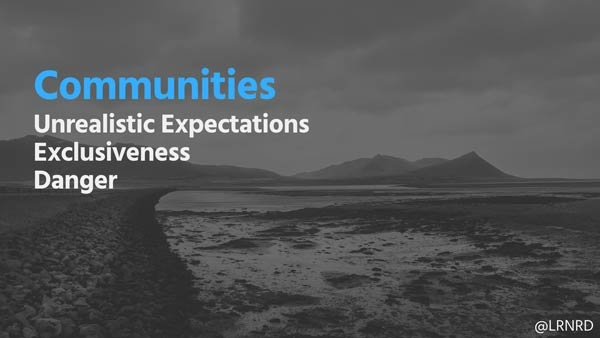
Free, Libre, and Open Source Software communities, or FLOSS communities, perpetuate the aforementioned characteristics of this industry, for example, the lack of diversity, upholding the illusion of meritocracy, and harassment. There are additional community-specific issues though.
Maintaining FLOSS projects comes with many expectations from software users in terms of security, availability, transparency, communication, and progress of these projects – which can lead to guilt and burnout for maintainers. There are many stories of people who ultimately had to give up working on Open Source because of these reasons.
- Maintaining Open Source Projects (pdf, from page 8)
- Open Source Guilt & Passion
- Leadership, Guilt, and Pull Requests
- What success really looks like in Open Source
- Tips for new Open Source Maintainers
- The Dark Side of Open Source
- A lot happens
- What Part of “… for Life” Don’t You Understand? (presentation video)
- What Is Open Source & Why Do I Feel So Guilty? (presentation video)
- The Social Coding Contract (presentation video)
On the flip side, many FLOSS projects hugely lack beginner-friendliness and accessibility.
And many FLOSS community spaces are even unsafe and dangerous, especially for members of underrepresented groups. As mentioned before, there’s a widespread expectation that people in tech contribute to Open Source projects – but many projects lack documentation, accessibility, and are generally spaces that are neither safe nor welcoming to new people or members of underrepresented groups.
Organisations
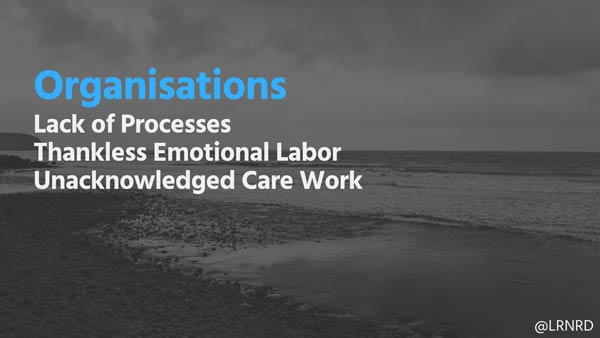
In organisations, all aforementioned levels accumulate as well.
In companies and other workplaces, bad communication habits and lack of processes are often weakly attempted to be solved by adding more tools to the problem. I’ve worked in other industries before, but I’ve never seen so many communication tools used like in the tech industry. Every weekday, we’re active on Slack for 2 hours 15 minutes. Every day, we receive 88 business emails. On top of that, we use GitHub issues to communicate, we use ticketing systems for managing projects, and even SMS or phone call to get notifications when our service is down.
In theory, there’s a lot of communication going on – but we can still feel detached really easily, and feel like we don’t get anything done because of the constant demand for attention. But all of these tools are great, so what’s the problem? A chronic issue in tech is the lack of processes and structures in organisations, which becomes particularly painful in the field of communication. We don’t have processes, but we love shiny new tools, so instead of creating good processes, we think another tool will be the solution, and, after some time, we blame the tool for not fixing our communication problem. This is an issue that’s deeply rooted in the way we organise our work – and it’s again linked with the under-appreciation of “non-technical” work in tech.
There’s a similar lack of recognition for emotional labor. Emotional labor are all of the tasks that come with understanding and managing other people’s emotions, and it’s often vital to keep organisations running – but is widely undervalued, underestimated, and unpaid work.
- Women in Tech and Empathy Work
- Geek Feminism Wiki: Emotional Labor
- Corporate feminism and thankless emotional labor
- Thankless emotional labor as management training
There’s also a widespread lack of acknowledgement for care work in many organisations. Care work includes, for example, caring for children or relatives. And care work is mostly not considered actual work. “Actual work” is only time spent coding – while women who balance a career with caring for children put in up to 80 hours of paid and unpaid work per week.
A friend of mine works as a software developer every day from 10am to 3pm. When she started working at her new job, her coworkers said to her: “oh wow, I’d love to come into work as late as you, and leave again so early!” What they didn’t see: My friend gets up at 6am every day to prepare everything for the day and take care of her child, and spends 4-5 hours after her work as a developer with her child. In fact, she basically works every day from 6am to 7pm, that’s 13 hours – but only the five hours she spends in the office are considered “actual work”. This goes for many parents, as well as for people who do other forms of care work, like caring for other relatives. Care work can be very exhausting, and the fact that it’s still not considered work in our societies adds to that exhaustion.
These are just some of the factors and layers that can shape our existence in the tech industry.
Society
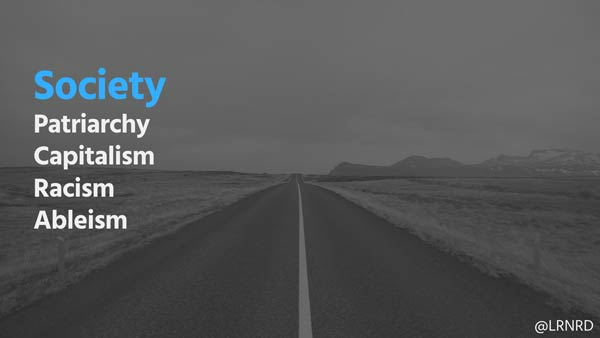
But the tech industry itself, and its parts, are also part of societies – and so are we as humans.
System-related issues within our societies influence this industry and our existence in it as well: patriarchy, capitalism, racism, ableism, poverty, and other forms of oppression have shaped our societies, and shape the daily lives of everyone in them – including our lives.
We live in patriarchy – a social construction in which men hold most of the power, political leadership roles, moral authority, social privilege and control of property. Patriarchy has been deeply engrained in our societies for hundreds of years. Patriarchy enforces gender roles and is oppressive on humans. And patriarchy also deeply influences our interactions at work, even more in a homogeneous space like the tech industry.
Capitalism does just the same. Most of us live in capitalist systems. Capitalism as an economic system is based on privatisation of production means and striving for profit. Capitalism has led to unequal distribution of wealth and income, unequal power distribution, and more harm for humans.
Being human
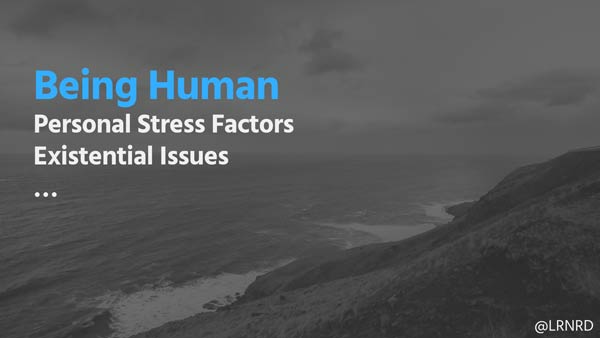
And there are factors about being human that can add to all these aforementioned levels: personal stress factors, like relationship or family issues, the stress through job search or client search, existential issues, and many more can make our own existence very difficult.
Summary Part 1
All these issues I’ve mentioned so far (and there are many more) have a huge impact on what existing in the tech industry can be like for us as humans. This impact can be even stronger for members of underrepresented groups who are affected by several of these issues and where they overlap.
Consequences
Directly or indirectly, all of them can have consequences on our lives:
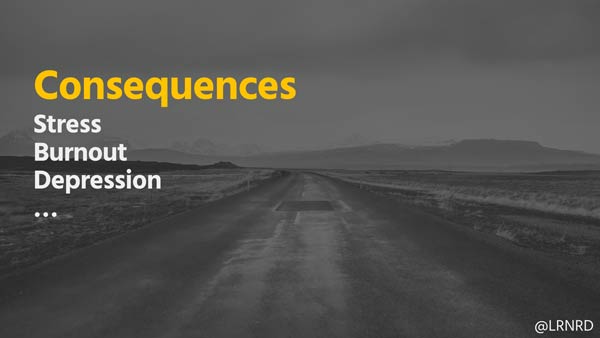
They can cause or increase pressure, which can lead to temporary and ongoing stress. Ongoing stress harms our physical and mental health: it weakens our immune system, can impair our body’s ability to function, increase our blood pressure, and can cause harm in our brain.
These issues, left unacknowledged, can also lead to burnout, depression, and other mental health issues.
No matter what they do to us: the tech industry and tech culture can significantly harm our physical and mental health – and therefor our existence and lives as humans.
About “existing”
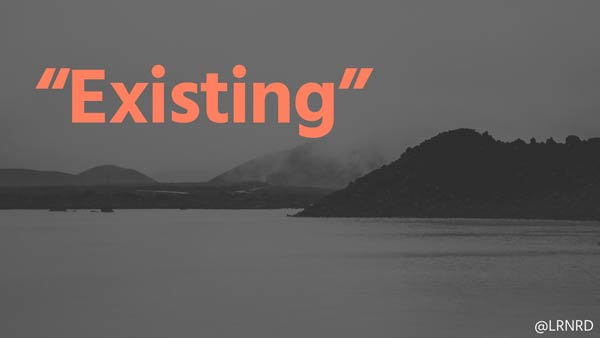
This is the reason why this talk is about existing in tech – and not about “thriving,” or “succeeding” in this industry. What success means to you is very personal, and even “existing” can mean different things for us individually, since we’re all affected by different layers of oppression.
In tech, it’s also extremely limited who actually gets to “succeed” and “thrive”: leaders in tech are mostly cis white men, and minorities in tech are still paid significantly less than others.
Finally: When getting out of bed felt impossible to me, I never wanted to even think about pushing my career forward. When success meant leaving my flat once every few days, I’ve found that somehow managing to stay and “exist” in the tech industry would already be a great success.
- On Developer Burnout
- Burnout Is Real: How to Identify and Address Your Burnout Problem
- Stress and depression – a taboo in our time – how love for your work can hurt you
If you can’t stand the heat…
When people talk about their experiences in tech, someone will always say: “If you can’t stand the heat, get out of the kitchen” – a proverb implying that it’s the individual’s fault if they can’t exist in a space.
To that I want to say: no. It’s not.
If you can’t stand the heat, the kitchen wasn’t designed for humans. The tech industry is a space that’s designed for a very specific group of people – and therefore excludes many of us by design.
And leaning in(TM) won’t help us when the kitchen is on fire.
Things I’ve learned about existing in tech

In the next part of this talk, I want to show you things I’ve learned about existing in tech.
My learnings about existing in tech are shaped by my personal experiences with burnout, depression, and being human. But I’m not a medical professional and I’m privileged in many ways, so what worked for me may not work for you.
Many of the problems we’re facing are caused by systemic issues, systemic oppression, and systemic violence – in the tech industry and its parts, and our societies.
One of the most helpful things for many of us right now would be:
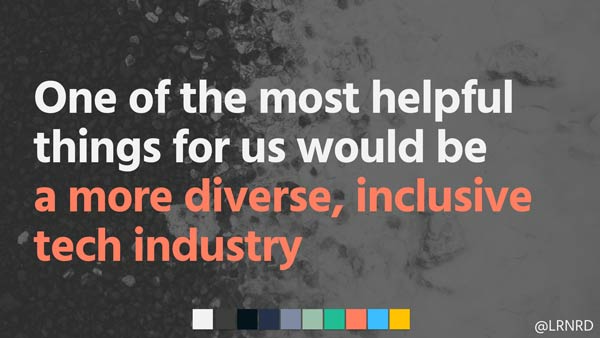
if the tech industry, its communities and organisations became more diverse, inclusive, accessible, safe, respecting places for everyone. Many people are working on making this change happen, but we’re not there yet.
So all I can show you to help you exist in tech are just
Workarounds
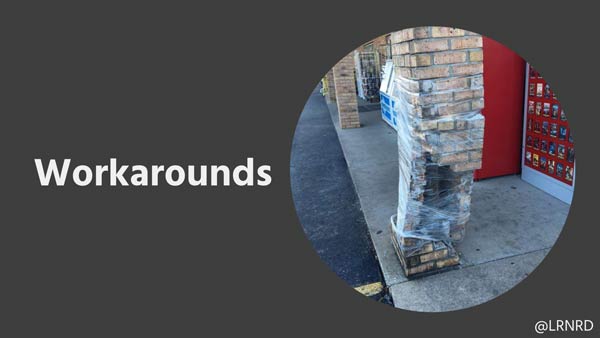
workarounds. Workarounds to help us exist, despite problems that aren’t our fault in the first place. The goal of all these things is NOT to make you a functioning person in tech again. The goal is to help you take care of yourself while working on software.
16 Things
If you’re stressed, burnt out, or live with mental health issues, there are things that may help you find immediate relief. Here are some things I’ve learned along the way:
01 – Realising that something is wrong
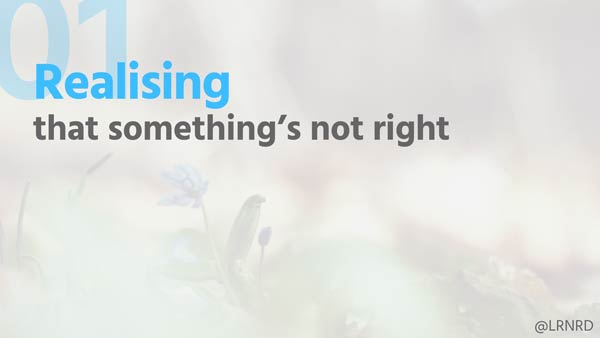
One of the hardest things for me was acknowledging something was wrong with me. Realising that my physical weakness, never-ending tiredness, insomnia, panic attacks and endless bad thoughts were symptoms of something bad happening with me. Understanding this took me a long time, but acknowledging it already began to help me.
02 – Finding out what the problem is
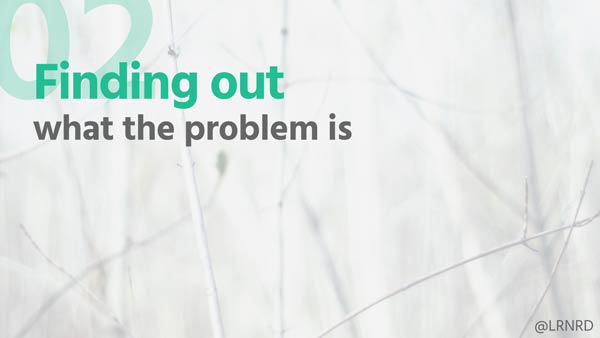
The next step for me was finding out what the problem was. For months, I had been hating my job, and everything I did at work. I felt exhausted, and, at the same time, felt like my work wasn’t making any progress. Realising that these and other ongoing symptoms can be signs of burnout was a relief for me. I didn’t know what was causing them yet, but it turned my bad feelings into something with a name. Being able to name things can be very powerful.
03 – Remembering it’s not your fault
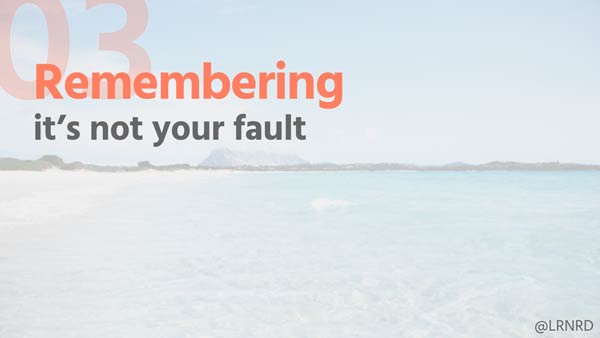
My initial reaction then was to blame myself, as I had done many times before. It took me a long time to understand not everything that goes wrong at work and that makes my work difficult is my own fault. I have my own limitations and faults. But—all of us live and work in oppressive systems, and oppression harms us—and it harms some of us more than others.
- Read This If You Are Your Own Worst Critic (And You Need To Give Yourself A Break)
- The Trouble with Imposters
- How The Rhetoric of Imposter Syndrome Is Used to Gaslight Women in Tech
- virtuoso – A workshop on fighting impostor syndrome
- 10 Things to Remember When You Feel Unsure of Yourself
04 – Doing only one thing
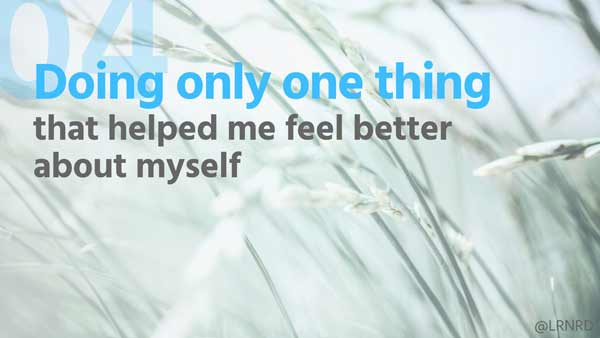
In my times of heavy depression, all I was able to do was stay in bed and watch animal documentaries. When I started reading articles on what to do to feel better, I felt even worse. All those things I was supposed to do in order to feel better felt like just another obstacle.
So I tried doing only one thing. One small thing that could help me feel a little bit better about myself and my situation: for example, making my bed. Experimenting with eyeshadow colours. Leaving the house. I started with small tasks that focused on my well-being, and took it from there.
I also tried to give myself permission to feel bad. I often felt like everything was so bad and I couldn’t do anything about it – but had to somehow make everything work, felt that I had to somehow manage to get my life back together. Giving myself the permission to not fix my whole life immediately helped me reduce the pressure I put on myself.
- 15 Easy Things You Can Do That Will Help When You Feel Like Shit
- Everything Is Awful and I’m Not Okay: questions to ask before giving up
- Productivity for the depressed
- Working with depression
05 – Getting professional help

At one point, I felt that I couldn’t cope with my situation alone anymore, and decided to try and find professional help. After some time, I was lucky enough to find a great, compassionate therapist that I’m seeing twice a week now.
Getting professional help can be very difficult. It can come in many forms: from seeing a doctor, calling a hotline for people in crisis, participating in an online self-help programme, joining a self-help group, or doing therapy. There are online search engines and websites with information that offer overviews of ways to get help in your situation.
My therapy has helped me feel better, understand the reasons for my struggles and how to respond to them, and helped me gain more strength.
06 – FINDING little big things

Sometimes seemingly little things can help provide relief. A friend of mine started sending me cute dog gifs everyday. That was a very small, but very welcome distraction, and something that always helped lighten my mood. Sometimes just an instance of joy over a cute animal became a personal highlight for me.
Prevention Techniques
When I started feeling better, I also wanted to learn about prevention techniques and other things that could help me take better care of myself in the long run, while working in tech.
07 – Understanding my limits

One of the most difficult learnings for me was, and is, accepting my own limitations. My time, my energy, my emotional resources are limited. Learning this and starting to enforce my boundaries has taken me many years. For a long time, I thought that I just had to try harder, work more, to make things work. But I can’t.
This also included learning to say no. No is a simple word, and a big challenge for me. I’ve always had several side projects like a feminist blog project I was part of, conferences I co-organised, and many more things. At one point, I was at such a low that I had to give up many of them – just because I couldn’t do anything anymore. I love working on side projects, and I love helping people out as much as I can. I’m trying to be more conscious about what I get into now.
08 – Learning warning signs

What has also helped me was learning about things that have the potential to harm me. These include bad companies, bad communities, and bad people, like harassers and abusers. I try to avoid all of these triggers – which is sometimes easy and sometimes very difficult.
09 – Beating stress
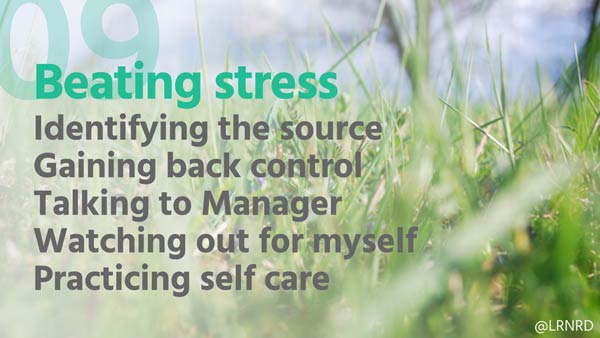
I’m also learning to identify other sources of stress, and changing the way I react to it. Stress can be intensified by feeling like there’s so much to do, and not enough time. Getting back control help with that. In my most stressful times, random work related thoughts would pop into my head at nights and on weekends. So I developed a new habit: Every time this happened, I added it to a special note on my phone. By the time I was back at work, the first thing I did was look at this list, and work on these items – because apparently they were bugging me. This helped me a lot—to get things out of my head during my time off, and also turn them into something that I could feel productive about.
When I realised that things at work were the reason for my ongoing stress level, I also tried to talk to my manager. Together with them, I developed ways to help me. Unfortunately, this is not always possible for everyone.
I’ve also learned to better watch out for myself. Some things are very important for the human body, but can be easy to forget. I tried to eat proper food, drink lots of water. Move or exercise. Take breaks from work, and tried to get enough sleep. These basic things are fundamental requirements that our bodies have, but I’ve found them very difficult to remember in stressful times. Same goes for learning about self care, and developing habits to take better care of myself.
- Why I don’t bring my ‘whole self’ to work
- How to Deal with Stress: 33 Tips That Work
- How to deal with stress at work
02 – Learning to identify burnout
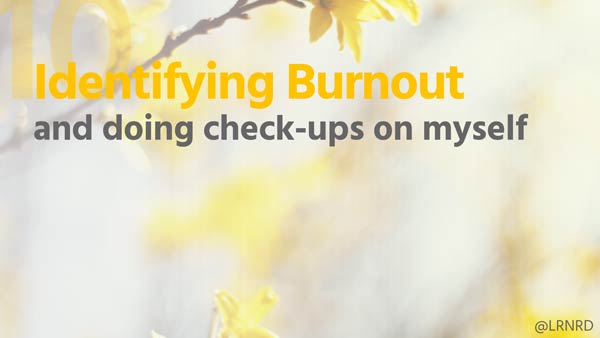
I also learned about specific dynamics that could increase burnout probability for me. This came with learning to identify the first signs of burnout before I reached full burnout mode, so I can react faster in the future. I try to do frequent check-ups on myself and my work now. But, like many other things, I’m still learning that.
- How to Recognize the Signs of Burnout Before You’re Burned Out
- Burnout Is Real: How to Identify and Address Your Burnout Problem
- To smile again
- How to avoid burning out at work
11 – Being more open
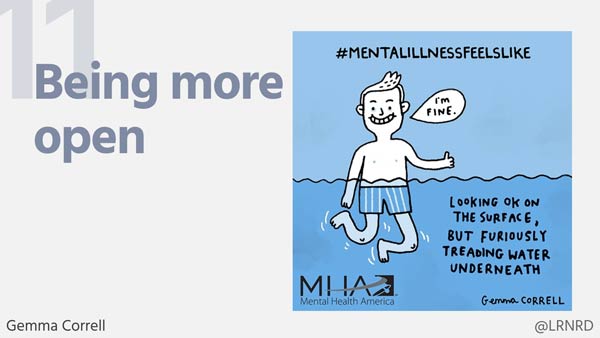
I started taking small steps in being more open about my mental health. As this comic by Gemma Correll shows, mental illness feels like being in water, looking okay on the surface, but furiously treading water underneath.
Mental health issues are still extremely stigmatised in our industry where so-called “merit” is everything. This stigma is dangerous, since it leads to people lacking information, and not knowing it’s okay to get help, and how to get that help.
I’m only able to speak about it in public now because many, many others have done so before me, and because I’m privileged enough to do this without having to fear negative impact on my career. Speaking up about those topics has also helped me make strong connections with others who are living with similar issues. If you’re in a position where it’s possible for you: speak up about those topics. Raising awareness can help other people enormously.
12 – Supporting change in the tech industry
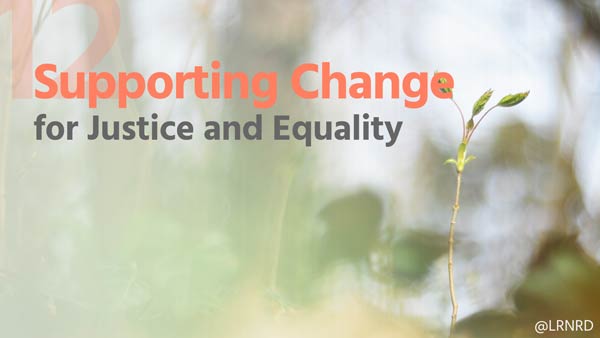
Most of the things I’ve mentioned so far that helped me cope are workarounds. But there’s one thing I deeply believe in that’s not a workaround: it’s the fight for change in the tech industry. This industry and our societies are oppressive systems. Many people are working on change for justice and equality in this industry. Join us.
Start by educating yourself, practicing empathy, addressing your privileges and biases, listening to underrepresented people in tech, working on diversity and inclusion, and work on becoming an ally. This change in this industry is something we can do to make tech better for us as people in tech. For our own present, future, and for generations after us.
Working on this change is the most important task we have as people in this industry right now, and it’s the only way to change these systems into a positive direction.
13 – Supporting others & showing solidarity
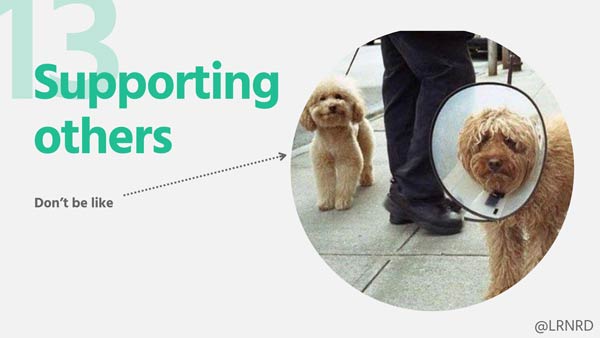
Your personal experience from working in tech may differ from many experiences I’ve mentioned in this talk, and tech may feel like a great place for you to be in – and that’s cool. But there are people in tech different from you who have to fight for their existence in this industry every day. Support them.
This support can come in many forms – it can mean educating yourself about systemic issues in tech, practicing empathy towards them, mentoring someone or donating money to people and organisations. It can also mean calling out bad behaviour when you see it in your community, helping make community spaces safe, and showing solidarity for underrepresented people in this industry.
And—if there’s a person in tech who means something to you, who inspires you, who you learn from—tell them about it. Let them know that their work and their being in this industry means something to you. Show some kindness – because there’s enough hatred in this industry already anyway.
14 – Building Networks
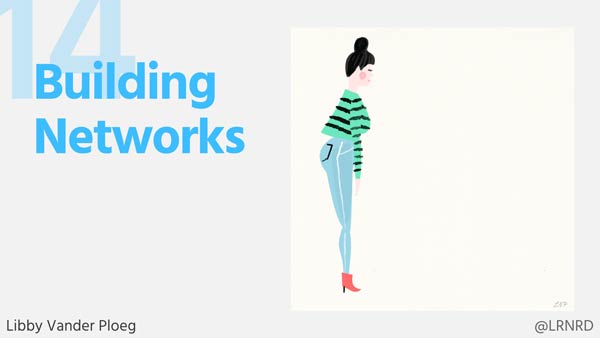
I’ve been socialised to see other women as enemies, because there can only be one person on top of the career ladder, right? I had no idea how wrong I was. It took me years to learn that this is an old technique to turn underrepresented people against each other. And that there are many people in tech who face much harder oppressions and issues than I as a cis white woman do.
One of my greatest sources of strength and empowerment I’ve found in tech are the networks I’ve become part of: places where I met people who understood, and who are facing similar difficulties. Networks that are places for venting, emotional support, advice, mentoring, and sharing good news (and cute animals). I’ve met people I could learn so much from, some of whom I’m now lucky enough to call friends.
No matter your gender, sexual orientation, ethnicity, age, background, or native language: there are people in tech who are like you. You may still be part of an underrepresented group in tech. But there is a group. You are not alone in this.
- Seeing Other Women As Allies, Rather Than Enemies: A How-To
- America Ferrera: Other Women Are Life Partners, Not Competition
15 – Knowing there’s a door

I’ve now talked so much about existing in tech, but there’s one thing to remember: there’s a door. There’s an option to leave this industry.
You may have many great reasons for staying in tech – and that’s fine.
But being in this industry can also mean death by a thousand paper cuts, especially for underrepresented group. When I talk to other women in tech, we sometimes joke: “So, what will you do *after tech*?”, because for many of us, there is this “after tech,” this dream of a time when we leave the industry and never come back. And leaving tech is not a sign of weakness.
A year ago, I was strongly considering leaving the tech industry. For months, I wrote a post about my experiences in tech. A post I never published. Its title was: “Today I leave the tech industry.” In the end of it, I wrote:
I may return to this industry at some point, because, hey, I’m still a geek. But I’m also a human being, and for now, I have to protect myself from this toxic environment. I have to regain my ability to breathe, function, and basically: my ability to live. I have lost my strength, my power, my energy.
I never published this post, I never left tech entirely. This draft is just quietly sitting on my server; sitting there, waiting for me. Waiting for the day when I leave the tech industry.
Whatever you choose, know there’s a door. What’s behind this door may be very unclear for you right now, and there may be reasons for you not to walk through it—it may be impossible right now. But, know that it exists.
Trial and Error

As you can see from the 15 steps I mentioned up to now, there are no prepackaged solutions. I’ve talked about things that can help bring some immediate relief, like acknowledging that something is wrong and finding out what the problem is, remembering it’s not your fault, etc..
And there are prevention techniques like acknowledging your own limitations, learning warning signs and beating stress, and building strong networks.
Most of them are workarounds. In fact, many things about existing in tech are like software development, and, well, in life: trial and error.
This is why there’s only one more, one very important thing left that I want to tell you:
The most important thing

You matter.
Regardless of your gender, ethnicity, mental or physical health, ability or disability, regardless of your age, origin, background, sexual orientation, or career path: you matter. You’re a valuable person.
Although many people in tech may tell you the opposite: you matter.
Despite all the pressure, stress, harassment and abuse you may be facing: you matter.
Your opinions matter. Your work matters.
You are valuable. You are significant, relevant, and worthy of note.
Your value does not depend on anyone telling you these words. It’s intrinsic.
No one matters more than you, because there’s only one version of you. And the world would be a different place without you. We are lucky that we get to work with you on technology right now. And we’re lucky to have you here today.
Please take care of yourself while working on software.
Because you matter.
✨⭐️✨
Update Log:
- June 07, 2016: Added link
- June 10, 2016: Added “The most important thing”
